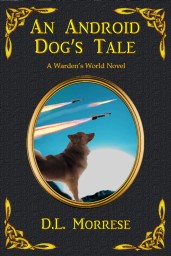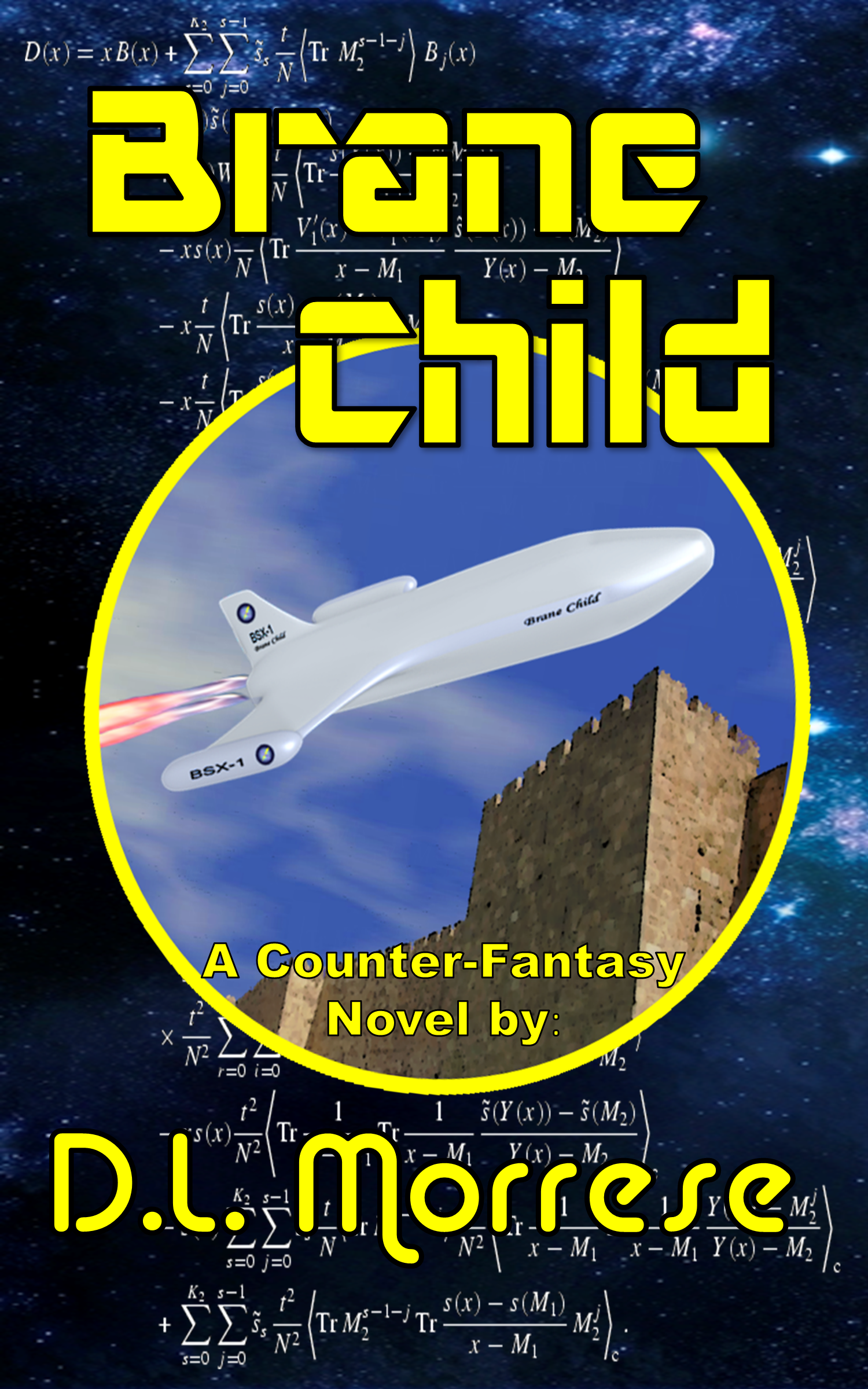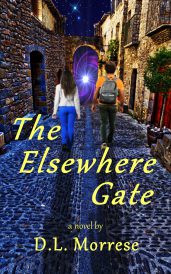The Difference between Science Fiction and Fantasy
 Both science fiction and fantasy present things that do not exist. All fiction does this, of course. That’s what makes it fiction. But science fiction and fantasy include not only imaginary characters and events but settings, creatures, concepts, or devices that are qualitatively beyond our normal, everyday experience. If you are fortunate enough to have a brick and mortar bookstore near you, you are likely to find science fiction and fantasy grouped together in the same section of the store, probably labeled (logically enough) “Science Fiction / Fantasy,” and although they share some characteristics, there is, I think, a clear and unambiguous distinction between them.
Both science fiction and fantasy present things that do not exist. All fiction does this, of course. That’s what makes it fiction. But science fiction and fantasy include not only imaginary characters and events but settings, creatures, concepts, or devices that are qualitatively beyond our normal, everyday experience. If you are fortunate enough to have a brick and mortar bookstore near you, you are likely to find science fiction and fantasy grouped together in the same section of the store, probably labeled (logically enough) “Science Fiction / Fantasy,” and although they share some characteristics, there is, I think, a clear and unambiguous distinction between them.
Fantasy may be as old as speech. From the time we, well, not us specifically, I mean our ancestors, could communicate more than simple facts, people probably made up stories to explain the inexplicable, like where rain, thunder and babies come from. I’m talking about our earliest ancestors here, not those now living at a ’55-or-older’ community in south Florida, although they probably made up some good stories, too. The people I mean are those who first discovered that they could chip flint to make sharp points to put on the end of long sticks, which they then used to hunt for food and intimidate their neighbors who had wild cave-painting parties late into the night or played their music too loud. I can easily imagine them huddled around a fire, once they got around to discovering that, telling tales filled with imaginary creatures and mystical forces, which remain the defining characteristics of fantasy to this day. Fantasy is as old as mankind.
 Science fiction, on the other hand, is a relative upstart, a form of fiction that has its roots in the Age of Enlightenment. Science was an element in fiction as early as the Seventeenth Century, included in works by Francis Bacon (New Atlantis 1617), Johannes Kepler (Somnium 1634), and Francis Godwin (The Man in the Moone 1638). The term ‘science-fiction’ wasn’t coined until 1851 by the English author, William Wilson. The first known reference to ‘science-fiction’ appears in Chapter Ten of his book A Little Earnest Book on a Great Old Subject, but it did not come into common use, apparently, until the 1930’s. I’m not quite that old, so I can’t say I have any first hand knowledge of this, but I have it on good authority that this is true (see references below).
Science fiction, on the other hand, is a relative upstart, a form of fiction that has its roots in the Age of Enlightenment. Science was an element in fiction as early as the Seventeenth Century, included in works by Francis Bacon (New Atlantis 1617), Johannes Kepler (Somnium 1634), and Francis Godwin (The Man in the Moone 1638). The term ‘science-fiction’ wasn’t coined until 1851 by the English author, William Wilson. The first known reference to ‘science-fiction’ appears in Chapter Ten of his book A Little Earnest Book on a Great Old Subject, but it did not come into common use, apparently, until the 1930’s. I’m not quite that old, so I can’t say I have any first hand knowledge of this, but I have it on good authority that this is true (see references below).
It may be hard for us living in the 21st century to imagine, but people did not always regard the scientific method, that is, empirical evidence obtained through observation and experimentation, as the best way to understand things about the world. In many societies prior to the Enlightenment, reality was what your tradition, king, or priest said it was, and you had a much better chance at living to a ripe old age of about 40 by not questioning them. (The average European life expectancy in the 17th Century was 35.)
According to my old and somewhat tattered copy of Webster’s Ninth New Collegiate Dictionary, (you knew I’d include a dictionary definition in this somewhere, didn’t you?) science fiction is “fiction dealing principally with the impact of actual or imagined science on society or individuals or having a scientific factor as an essential orienting component.” In other words, science fiction relies on a scientific foundation for the speculative elements of the story. The tone of such stories was originally a positive one, supportive of a scientific outlook and optimistic about the possibilities science creates. Wilson’s usage of the term in 1851 is in reference to the laudable goal of using science fiction to popularize real science. The best of the genre, in my opinion, still does this.
 Jules Verne and H.G. Wells are two of the earliest true modern science fiction writers. Both stretched the bounds of what was known at the time to posit things that did not exist. Unlike earlier, and even much of the other speculative fiction of the time, though, they based their plot devices on extrapolations from current science and technology. Previous visits to improbable lands, encounters with strange creatures, and even fictional travels through time were often the result of a dream or mystical insight. Both Wells and Verne presented their readers with fantastic machines, but these were based on scientifically explained principles. They included strange creatures, but they were natural rather than supernatural, with abilities explainable, at least in theory, solely in terms of biology and evolution.
Jules Verne and H.G. Wells are two of the earliest true modern science fiction writers. Both stretched the bounds of what was known at the time to posit things that did not exist. Unlike earlier, and even much of the other speculative fiction of the time, though, they based their plot devices on extrapolations from current science and technology. Previous visits to improbable lands, encounters with strange creatures, and even fictional travels through time were often the result of a dream or mystical insight. Both Wells and Verne presented their readers with fantastic machines, but these were based on scientifically explained principles. They included strange creatures, but they were natural rather than supernatural, with abilities explainable, at least in theory, solely in terms of biology and evolution.
Fantasy is less constrained. It can include just about anything — magic wands, vampires, dragons, demons, werewolves, genies, talking rabbits in waistcoats with pocket watches, … well, you get the idea. These things just ‘are’ and don’t need to be explained from a scientific, naturalistic, post-Enlightenment perspective. The magical elements must be internally consistent, but they don’t need to be based on known science. If the story includes supernatural or mythological characters or forces that cannot be supported with plausible sounding techno-babble in scientific terms, then it is fantasy. Well known examples would include Harry Potter, The Lord of the Rings and (my personal favorite) Terry Pratchett’s Discworld books.
There are, of course, books that fall into a gray area and even merge these two genres. A term that has been applied to these is ‘science fantasy.’ An example would be Star Wars, which is mainly a fantasy adventure with some science fiction trappings. The fantasy element is the Force, which is described as a mystical ‘energy’ field. The science fiction elements, obviously, are extraterrestrial aliens and space ships, although there is never much of an explanation for how the latter are supposed to work. Another example would be Star Trek, which is mainly science fiction but with some fantasy thrown in. One of the science fiction elements is super-luminal space travel, which the various series explain is achieved through a matter/antimatter reaction creating a warp in space-time. The fantasy aspects of Star Trek include such things as the scientifically unexplained psychic abilities exhibited by Vulcans and Betazoids.
Although there are many exceptions, science fiction stories also tend to take place in an imagined future or futuristic setting while fantasy tends to be set in an imaginary past, often a medieval type setting. This is not always the case, of course. There seems to be a growing popularity for fantasy that is set in current times with stories such as Harry Potter and a plethora of vampire and zombie novels. The possible combinations of settings and mixtures of fantasy and science fiction elements are extensive, and many subcategories of both genres have been identified. I won’t go into these here because they are beside the point of this post, but if you are interested, SF Site put together a good list (http://www.sfsite.com/columns/amy26.htm).
When asked to explain the difference between science fiction and fantasy, Isaac Asimov, the prolific writer of mystery, science, and history but known mostly for his science fiction, replied, “science fiction, given its grounding in science, is possible; fantasy, which has no grounding in reality, is not.” (http://www.sfsite.com/columns/amy26.htm) Although I am a great fan and admirer of Asimov, I think this statement is presumptuous because it implies that we know everything that is possible. I’m inclined to believe we don’t.
A distinction I like better was provided by the Canadian science fiction writer, Robert J. Sawyer who I had the honor of chatting with at the 100 Year Starship Symposium hosted by DARPA in 2011. He said, “Succinctly: there’s discontinuity between our reality and fantasy; there’s continuity between our reality and science fiction.” (http://www.sfwriter.com/2007/08/difference-between-science-fiction-and.html) To expand on this just a bit, I believe he is saying that fantasy proposes the existence of things we can’t begin to explain rationally. Science fiction, on the other hand, must present at least some backstory for how such things could exist and at least imply a plausible theoretical explanation rooted in what we currently know. Where did they come from? How might they work? What allowed them to evolve the way they did? Works of science fiction don’t need to answer such questions in any detail. They don’t require elaborate explanations in the stories, but the reader must feel that scientific explanations for them are possible. Somehow, the fictional marvels that are components of the plot or setting must link back to our current scientific understanding of the real world.
This is the key distinction. Fantasy does not require such things to have a basis in known science. Science fiction does. Science fiction, in the original sense of the term, is supportive of a scientific outlook and optimistic about humanity’s ability to use science to explain the universe and create a brighter future. In this respect, it is almost the antithesis of Fantasy, which has a mystical basis, positing the existence of things science cannot explain or, quite possibly, deal with.
To appreciate the distinction between the two genres requires some knowledge of science, of course. Without it, the reader has no foundation for distinguishing between ideas that are plausible, unlikely, or almost certainly impossible from a scientific point of view. You don’t have to be a scientist; you don’t need to have a firm grasp of general relativity or quantum mechanics (I certainly don’t), but you must have some familiarity with the major findings of science and an appreciation for how science approaches questions about the world through careful observation and experimentation. As Carl Sagan once said, “Science is a way of thinking much more than it is a body of knowledge.” (Broca’s Brain: Reflections on the Romance of Science, 1979)
This, I believe, may be the major cause of confusion about these two related but distinct genres. Scientific literacy, especially in America, could be better. If readers believe an opinion is the same as a theory or that intuition and insight are as likely to provide as reliable an answer to a question as controlled testing, then they will not be able tell the difference between fantasy and science fiction. Regular science fiction readers may be more scientifically astute than the general population and therefore more likely to understand the difference, although I know of no survey or study that has been done on this. I do know, at least from anecdotal evidence, that many current scientists and engineers were inspired by reading or watching science fiction when they were young, so at least in that respect, there is a connection.
But even people who believe a magic wand is no less implausible than a TV remote control or that telepathy is as likely as reliable cell phone coverage can read and enjoy fantasy and science fiction. Stories from both genres can be insightful, thought provoking, mind stretching and evoke a sense of wonder. Both can take us to strange and fascinating worlds. There is a difference between the two, but you don’t need to recognize it to enjoy the tales. Personally, I would imagine they are more enjoyable if you do, but this is just my opinion. It’s not science.
Related Post: More on the Difference Between Science Fiction and Fantasy (15 Oct. 2013)
Select References:
- Science Fiction & Fantasy: A Genre With Many Faces http://www.sfsite.com/columns/amy26.htm
- Science Fiction – Sci Fi Books ~ The Development and History http://www.booksellerworld.com/science-fiction.htm
- Fantasy (Wikipedia entry) http://en.wikipedia.org/wiki/Fantasy
- Science Fiction (Wikipedia entry) http://en.wikipedia.org/wiki/Science_fiction
- Science Fiction Studies http://www.depauw.edu/sfs/notes/notes10/notes.html
- Full text of A Little Earnest Book on a Great Old Subject by William Wilson
- The Cambridge Companion to Science Fiction http://www.google.com/url?sa=t&rct=j&q=&esrc=s&source=web&cd=7&ved=0CFIQFjAG&url=http%3A%2F%2Fsciencefiction.org.rs%2Findex.php%3Foption%3Dcom_docman%26task%3Ddoc_download%26gid%3D396%26Itemid%3D55&ei=3YWHT8WTHeiW8AGz96GnCA&usg=AFQjCNFggg_vtA91t9AXlWO6HEraK6XNkA (full text in PDF)
- The Perils of Scientific Illiteracy http://chiefexecutive.net/the-perils-of-scientific-illiteracy
- Unscientific America: How Scientific Illiteracy Threatens our Future http://www.alternet.org/environment/141679/unscientific_america:_how_scientific_illiteracy_threatens_our_future/
- Science Fiction & Scientific Literacy (Incorporating science fiction reading in the science classroom) http://science.nsta.org/enewsletter/2007-07/tst0602_38.pdf
(This article is cross-posted on 1889 Labs – The Future of Fiction: http://1889.ca/2012/04/the-difference-between-science-fiction-and-fantasy/)
Posted on April 21, 2012, in Fantasy, Science Fiction, Speculative Fiction and tagged difference, Discworld, enlightenment, Fantasy, science, science fiction, Star Trek, star wars. Bookmark the permalink. 11 Comments.












Reblogged this on adaratrosclair and commented:
Was going to write a post on this, but why when this is just so well written? Thank you, thank you, thank you! 🙂
How would you classify dystopian literature such as Daz 4 Zoe? I am trying to crowbar it into my fantasy unit, but not sure if I will get away with it…Thanks, Ali
I’ve never heard of that, but I seldom read dystopian fiction. The same basic concept should apply, though. If it ties back to known science, you can call it SF. If it has zombies or demons, chances are it’s fantasy. It does not need to be one or the other. It could simply be literary fiction.
Great article and very well written. Thank you for such an informative article on this topic.
thank you so much for this!!!
it helped me a bunch on my
english class. I had to do a venn diagram
on science fiction and fantasy!!!\
: D
Glad I could help. 🙂
Pingback: What is Counter-Fantasy? | DL Morrese
Pingback: More on the Difference between Science Fiction and Fantasy | DL Morrese
Pingback: Ibukun Taiwo | HOW I DIFFERENTIATE BETWEEN SCIENCE FICTION AND FANTASY FICTION
Pingback: The Gelfling Gathering – A Dark Crystal Prequel | DL Morrese
Pingback: A Discworld Update – February 2013 « DL Morrese